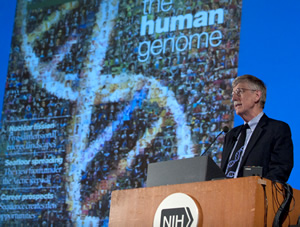Last updated: May 08, 2013
Nhgri Symposium Commemorates 10th Anniversary Of The Human Genome Project
NHGRI symposium commemorates 10th anniversary of the Human Genome Project
By Raymond MacDougall
Associate Director of Communications, Division of Intramural Research
 |
NHGRI Director Eric Green, M.D., Ph.D. welcomed the assembled crowd with reflections on the significance of the date. He chose the date for the symposium to coincide with the journal Nature's publication of the description of DNA's double-helical structure 60 years ago, and the 10-year anniversary of the completion of the Human Genome Project (HGP).
Dr. Green reminded the audience that generating the first human genome sequence required six to eight years of active sequencing and cost about $1 billion. But advances in DNA sequencing technologies have reduced both the cost and the time required to sequence a human genome to just a few thousand dollars and a few days, respectively.
David Botstein, Ph.D., a geneticist at Princeton University and one of the symposium's 13 guest speakers, marveled at the new technologies invented for the field and the many uses of DNA sequencing- from forensics to disease gene mapping and identification.
"It's the genome that started a whole field of biology which seeks to understand how genes and proteins talk to each other," he said. "That has got to be the way of the future."
Another speaker, University of Chicago geneticist Nancy Cox, Ph.D., said she felt privileged to be present at the celebration 10 years ago and to witness myriad discoveries since then.
"The things that have been highly significantly and reproducibly associated with common diseases and complex human traits, to date, really are the tip of the iceberg of what there is in even the genotype-level surveys that have been done," she said.
Those future generations of scientists were represented in the audience by NHGRI post-baccalaureate intramural research trainees. Hadley Bloomhardt, who works in the Human Development Section of NHGRI's Genetic Disease Research Branch, said she attended the symposium to learn more about how far genomics has come since the human genome sequence was completed 10 years ago.
"There is an incredible diversity of fields in which genomics has become increasingly important," she said. "I heard talks on subjects ranging from newborn exome sequencing, to the role of genomics in cancer, to disparities in access to genetic medicine. It is clear to me from this day that genomics will play an enormous role in virtually all areas of medicine in the future."
Other intramural research trainees were particularly interested in the talk by David Williams, Ph.D., who advised systematic efforts to ensure equitable access to genomic medicine.
"Minorities have elevated levels of illness even at comparable levels of education and income. Your zip code is a stronger predictor of health than your genetic code," he said. Dr. Williams also cautioned researchers from making generalizations and inferences about entire racial populations when genomic studies of diverse ancestral groupings are still limited.
Christopher Robles, a trainee in the Molecular Pathogenesis Section of NHGRI's Genome Technology Branch commented, "It was interesting to me that someone's socioeconomic environment affects their epigenome and got me thinking about ways we can perform genomic research to address health disparities."
Taylor Montminy, a trainee also in the Human Development Section, added, "I appreciated David Williams' presentation incorporating the idea that disparities in health can affect the way we will think about genetics," she said. "The study of genetics pervades scientific research on so many levels; I think that bringing in a public health perspective was a great way to highlight this idea."
NIH Director Francis Collins, M.D., Ph.D., who led NHGRI's efforts during the HGP, noted that, "We are still not in the post-genomic era," which is why NIH must continue its efforts to understand functions, pathways, networks and systems encoded by the human genome.
Dr. Collins also described future challenges, including the need to generate data sets to understand biology, train future scientists, and develop treatments for the diseases that are now better understood due to genomic advances. Today, scientists know the molecular basis of almost 5,000 disorders, but treatments are only available for 200 of those. Dr. Collins hopes that NIH programs, such as the recently established National Center for Advancing Translation Sciences, can help close that knowledge gap. Posted: May 8, 2013
